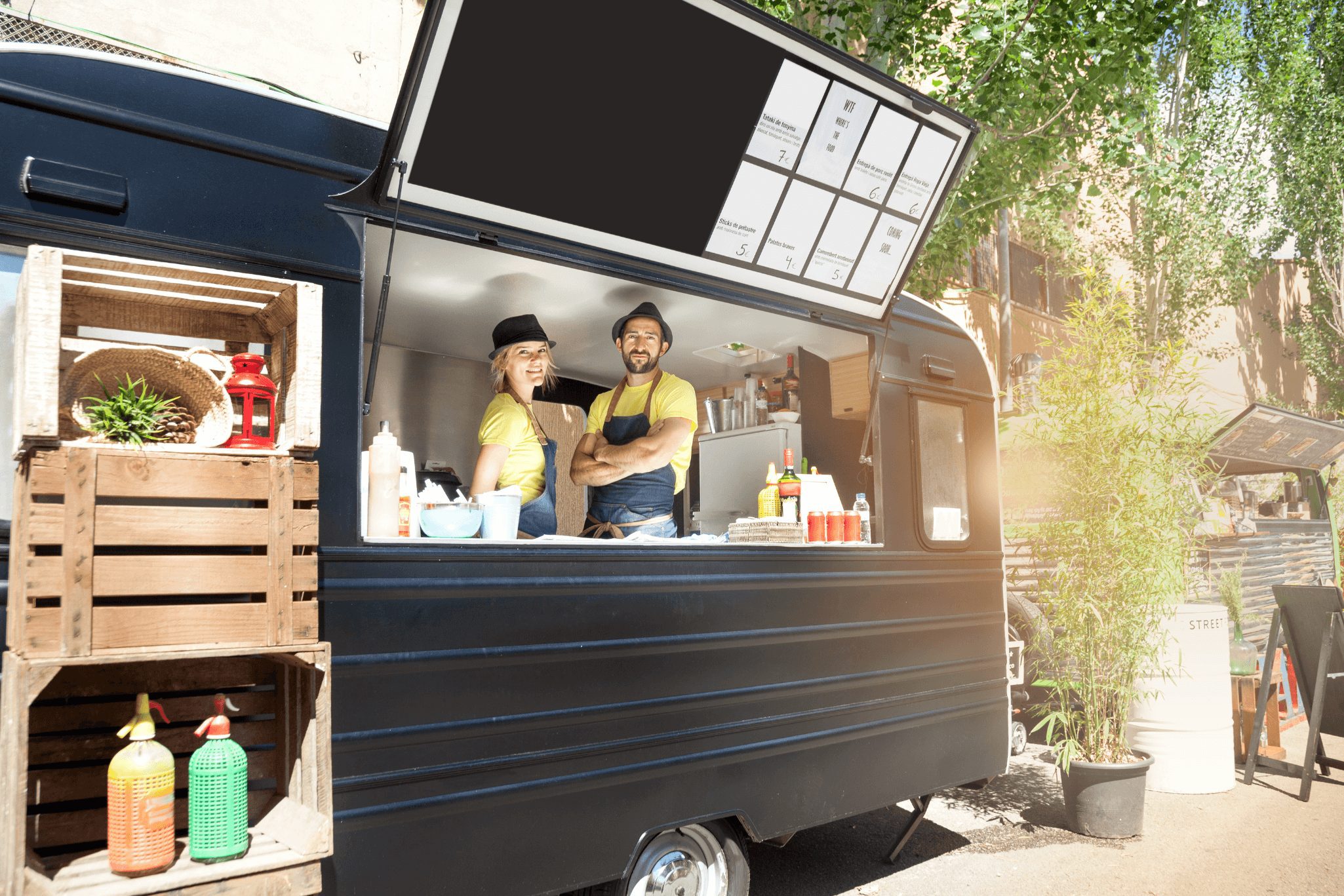A street food business serves quality food with individuality. The foods are served from a range of places including markets, festivals or special events.
The trend continues with street food being one of the most innovative and interesting concepts in the UK catering scene.
Companies serving street food must use quality sourced ingredients and serve high-quality foods. The owners will concentrate on one product and prepare and serve this to a high standard. Street food traders can operate and serve their products from any type of unit.
For example, in a food truck (Van), a trailer, or a gazebo, a key point for success is to brand your individuality.
Street food units can be split into three main areas:
- Trailer Operators
- Gazebo Operators
- Truck/Van operators
These operation units can all be used at many trading pitches including a local farmers market or a large festival.
Want To Skip Ahead?
- Street Food Truck Entrepreneur
- What Is Street Food?
- Street Food Pro’s And Con’s
- Business Model Set-Up
- How To Find Events – Google Search Method
- Common Health And Safety Mistakes
- Buying A Street food Business
- Street Food Hotspots Around The World
- Run Your Own Business Tips
- Branding With Social Media
- Onto The First Page Of Google
- Saving Money In A Food Business
- Growing Your Street Food Truck Business
An introduction to the street food business
The UK street food truck business is very popular today. One reason is, people want to start their own businesses at a relatively low cost, within the hospitality industry.
A food truck business can make a lot of profit although this comes with hard work and perseverance. You will also need to focus on the core areas of the business, such as choosing a profitable food to serve and locating pitches.
A food truck business entrepreneur
As a street food entrepreneur, you have the flexibility of working when and where you choose. You could be working at a local market once a month. Or working three days a week at events and festivals all over the country.
Starting a street food business is a great second career choice on a part-time basis or as a main career. The harder you work on your business, focusing on the core areas the more successful it will become.
Advantages of a street food business. The pros and cons
Street food entrepreneurs come from all types of backgrounds. Owners may have had a hospitality career or recently finished a cooking course or are looking to completely make a change in career direction. Some of the best and worst aspects of the business are listed below.
The positives of running a street food business
Customers satisfaction
Receiving compliments from your customers is a great feeling and an energy booster. It makes all the hard work you have put into preparing and cooking well worth it.
Expressing Your Ideas. Owning your own street food business means you must make all the decisions on how the business is run.
The business can be run exactly as you decide how you want to express yourself through your food and concepts.
Building a brand
Starting and running your own street food business is a great way to try out your concepts and build a successful brand.
A successful street food business can be the starting point for testing out your restaurant ideas if you want to move into the restaurant business later.
Being an entrepreneur
Running your own business is a great choice of career.
You will be able to make all of your own decisions and have control over when and how you work.
It’s possible to work full time or part time
When starting your business as a street food entrepreneur it is possible to start your business on a part-time basis. Weekends and evenings are the best times to run a street food business, so, for this reason, it makes a doable undertaking whilst still maintaining a regular job.
A street food business can be started as a part-time job and eventually grow into a full-time job to the point where it’s not possible to do both jobs.
The cons of running a street food business
The hard work
There is a lot of work that goes on behind the scenes in a street food business. This includes the preparation that needs to be done to get food ready. The planning of menus, sticking to budgets and having all the licenses and permits in place.
Along with keeping on top of new health and safety regulations. There are many tasks that need to be taken on before service even starts, and when it does, this can mean hours of standing and serving customers in a busy, cramped hot environment.
Maintenance of the unit
The unit will need to be kept in good working order. Trucks and vans are essential to your business and breakdowns will be a problem.
If your vehicle is out of action, then you have no business and no money. Make sure the vehicle is kept in working order by having regular check-ups and a backup plan should be in place for any breakdowns.
Difficult to expand
A street food business is a difficult business to scale up and expand as the operation is usually owned and run by one or, maybe, two people. There will not be enough cash flow to expand easily.
It’s important to understand if you are looking to get bigger at a later date, you should have a plan in place to do so from the beginning.
A well-branded business that is easy to set up and run will be less difficult to scale through a possible franchise system.
Do I need to be a qualified chef
Everyone with some cooking skills and the ability to cook tasty foods could open a street food business.
Many chefs use the lower costs of starting a street food business as a way of owning their own business, and many enthusiastic home cooks have done as well.
Being a trained chef will have its advantages and this can be achieved if cooking skills are needed.
You may, however, decide that you have the skills needed as a home cook and are looking for an outlet to serve your food.
The mission of a street food business
Working with popular UK street food
Street food ideas can take inspiration from all over the world. When choosing your style, think about what customers you are targeting. For example, a trendy street food market in London will have different food needs than a countryside county show.
When deciding on your food, take into consideration
- The preparation times,
- Cooking times,
- Cost of ingredients,
- Serving speed needed.
It is recommended to have as much preparation work done as possible the day before your event.
The better your preparation for an event, the smoother and faster your service will be. A range of different foods will take longer to prepare than a limited menu and the service speed can also vary considerably.
The street food business model set up
Examples of a street food unit set-up
The example below gives you an idea of how a street food business can be set up for an event. As you can see, it is a compact space for the chef and service people to work in.
In this example, the cooking is done at the back of the unit, and the food is served to the customers from the prep area. If a gazebo set-up is being used, the cooking equipment can be moved to the front.
In this way, the customers will see the food being prepared and enjoy that theatre of operation.
There may be extra space under the equipment, such as the LPG hobs on a table, and the prep area will have space underneath for storage.
You can imagine how hot and uncomfortable the working environment can become if all the equipment is being fully used during busy service time.
This may be a factor to consider when deciding if a street food business is right for you.
Street food business event ideas – The google search method
To find specific places to trade in your local area this Google search method works well.
STEP 1: Add your selected dates into Google followed by
‘Festival Trading Pitch’ or ‘Event Trading Pitch’.
STEP 2: Follow this with the UK or a specific area/location.
Example Google Search
- 18–19 June ‘Event Trading Pitch’ Cotswolds
- 10–11 August ‘Festival Trading Pitch’ UK
Generating names for a street food business
If you do not have a name decided for your business you will need one. There are many free name-generator tools out there.
Free Business Name Generator – https://biznamewiz.com
Register a street food business
As a street food entrepreneur, there are three main ways you could decide to register as a business. The first is as a sole trader, the second is as a limited company and the third option is registering as a partnership.
There are three types of partnerships to choose from: limited liability partnership (LLP), sleeping or dormant partners, and general partnership.
A sole trader and a limited company are the main types of street food businesses.
A sole trader
The simplest way to start a street food business is to register as a sole trader. This means that you as the sole owner operate the business, and you will run the business on your own.
A big benefit of this approach is that you will take home all of the profits and will be free from any registration fees. A weakness is that you will need to be a very responsible person and keep on top of all the accounts.
Limited company
Limited companies exist as individual companies, and can be registered through Companies House. The finances of a limited company are consequently separate from the personal finances of the owners.
Shareholders will not be responsible for any debts acquired by the company but could stand to lose out on their original investment if the business runs into trouble.
There are two types of limited companies:
Private limited and public limited
Between these two types of companies, there exist a few differences. Public limited companies are legally allowed to raise funds by selling shares of their company on the stock market, but private limited companies cannot.
Public limited companies must also have a share capital of £50,000 or more, with two shareholders, two directors and a trained/qualified secretary.
The start-up costs of a business
The start-up costs to become a street food entrepreneur hinge on your finances and ability to borrow. Nevertheless, for a basic setup, which serves a simple style of food, you will be looking at a range starting at £4000 to £5000; this will include the pitch fees.
You will then need to take into account additional costs on top of that, such as a truck/van or trailer. It is also possible to rent trailers and trucks from one day upward. There are also franchises available or street food businesses,
Street food business profit UK – How to make the highest profit
It is very important when starting out to have a Gross Profit Margin to stick to.
This is the profit you make on all of your foods and may need to be at least 70% GP to run and grow successfully.
Your net profit will come by taking all of your costs. These will include pitch fees and fuel away from the Gross Profit. Minimising wastage is a core area to focus on when controlling a Gross Profit.
Street food business plan – sample/template
The business plan
The best business plans will explain only the most essential information. They’ll list what you want to achieve, how you intend to get there and what you will need to do along the way.
Below I have included a sample template for a business plan.
The contents and notes are what would normally be expected in a plan, but should be altered to suit your own requirements.
Before completing the document, you will need to have done some research into competitor activity, pricing and the market for your services/ products etc.
How many hours will you need to put into your business
This is entirely your own decision, but as you start your business up you will need to put in a lot of hours than at any other time.
So if you are looking to only work on a part-time basis, you may find that you are still putting a lot of hours in.
This may include: finding pitches, building a website, and finding a suitable vehicle and equipment.
Once you have all of the basic groundwork done a certain amount of hours will still need to be spent on your business.
Due to preparing foods and buying stock. All these areas may need careful thought when thinking about How To Start And Run A Street Food Business.
Health and safety
There are certain core areas that need focusing on when you are looking into how to start and run a street food business. As a street food operator, you are responsible for the health and safety of your customers.
All of the equipment inside your operational unit needs to be safety checked and cleaned.
You will also need to have a basic qualification in food safety and be able to take risk assessments and understand HACCP regulations.
You will be using equipment that can be hazardous such as gas appliances and electrical equipment, these all need to be safety checked and given certificates by a qualified engineer.
Health and safety mistakes?
Health and safety are the big buzz phrase throughout the UK business community. And you better believe that this applies to your catering business.
A negative report from the health and safety officials that will check up on you after set periods of time. This can result in negative results for your business that will drop your gross profit.
Common catering business health and safety mistakes
This can range from an increase in premiums to an outright shutdown. To keep this from happening, work hard to account for all existing laws and exceed them each and every time.
To begin, consider these common health and safety mistakes that catering businesses in the United Kingdom often fail to account for.
Food handler training for your catering business
Anyone in your catering business who comes in contact with food at any point. And that will likely be just about everyone, must have proper training.
Not only does health and safety require it, but your customers will also insist upon it.
A proper food hygiene certificate, training regime, and constant brushing up on food service-related laws are essential. This is needed in order to avoid many of the health and safety mistakes often seen in the catering business.
Food hygiene certificate
It is important to understand that existing health and safety laws in the UK do not require all food handlers to have a food hygiene certificate when either preparing or selling food. This applies to caterers as well.
However, the best practice is to insist that all of your food handlers have this document. That being said, the certificate must be earned. The process that is involved is rather stringent.
Most food handlers can get their food hygiene document via on-the-job training, online or classroom study, and job experience that is relevant to the job. Once a food hygiene certificate is granted to a food handler.
There will usually be a refresher course that can be done after a three-year period.
That being said, either the food business operator or the (EHO) health officer assigned to inspect your catering business. May decide at any time that a refresher course is needed.
To keep up with your insurance, you will want to be sure to take care of those training requests. Do this as soon as you can in order to maintain the food hygiene certificate.
Use proper food handling procedures
It is essential at all times that proper food handling procedures are put in place and followed throughout your catering business. This goes for any actions taken directly at your own location and continues to the facility where you are providing services for.
You should imagine that people are always watching and will be concerned that you are taking actions to guard against any foodborne illnesses.
At the same time, nothing will wreck your catering business more quickly than a guest who develops a food-related sickness at one of your venues.
Also, this is a huge mistake that will affect your insurance and impact your ability to sustain your business integrity.
To avoid this, remember to review the following food safety concepts with your staff on a regular basis, regardless of whether or not each member of your staff has a food hygiene certificate:
Key Areas Are:
- Effective hand-washing methods
- Ensuring that foods are chilled as quickly as possible
- Properly clean all plates, dishes, and cutlery
- Guard against allowing sick staff to work
- Get rid of bugs and other pests from your food prep area
Following these guidelines will not only help improve your name throughout the catering business; they will also make you more insurable.
Yes, it is important to follow the guidelines set by Health and Safety, but it is equally important to keep your insurance rates as low as possible.
How to buy a street food business
Tips and Advice on How to Buy A Street Food Business and What To Look Out For When Buying A Vehicle
When you are selecting your unit. There are essential points to remember that will save you money and time in the long run.
Decide on your menu first, and then when it comes to buying a vehicle you can select one that already has the equipment you will need.
Make sure the vehicle is health and safety passable with an LPG certificate and an Electrical certificate. Try to keep your costs down when first starting out.
Essentials to theme your food unit
Once you have a vehicle selected, get it branded by a sign-making design company or completely wrapped in your design to your specific instructions.
The set-up needs to be themed and attractive to both the organiser and the customers.
Remember:
- Make sure your unit is clean inside and out.
- Make sure your unit has clean signage.
- Get a personal hygiene certificate and a certificate display in your unit.
- Register your company and register for self-assessment.
- Get an accountant.
- Make sure your unit has a clear menu with prices.
- Offer a unique idea/concept.
- Be aware of new events or people selling pitches.
- Do in-depth research and get evidence and contracts.
- Make sure you have the relevant insurance.
Street food hotspots from around the world
There are many countries all over the world with great street food all areas will have their own regional specialities and some will also have foods from other areas of the world. To follow are some countries with great street food.
Copenhagen street food
Copenhagen is the capital of Denmark with very popular street food markets. And one of the main markets with food and stalls is Copenhagen itself, which serves cuisines from all over the world including Brazilian, South Korean and Indian.
Thai street food
Bangkok is the capital of Thailand and has a range of traditional street food. What is the street food style in Thai? Thai food is quick to cook full of flavour and uses a lot of chillies. Thai street food is popular in the UK with many stalls at markets and festivals offering Thai food.
Italian street food
Italian street food is very popular in Italy with a quick flavoursome style. The UK has many Italian street food stalls and mobile caterers, foods will include pasta dishes and pizzas.
Indian street food
One of the most popular food cuisines in the world. What is street food in India – Indian street food is delicious and suits the UK perfectly. The Uk customer loves the spices flavours and heat of Indian cuisine.
London street food
London is a great place to experience street food, with a large mix of cultures there is a big demand for a broad range of street food. There are street food festivals happening regularly and many stalls are open all year round.
Street food cinema!
What is street food cinema? During the summer in not only London but all over the UK, there are many outdoor cinemas and festivals to set up a street food stall
“Street food is a good way to try new dishes and concepts on customers”
Run your own street food business tips
If you have a keen interest in cooking and can cook a number of great dishes and are looking to sell your food to the public, questions you will need to answer include:
- How do I set up a street food stall in my local area?
- Do I need to register for my food business?
- Is it possible to make a lot of profit and expand my food business quickly?
- Understanding and keeping on top of health and safety laws.
- What equipment is crucial?
- Where do I buy the equipment?
1. Mobile catering research
Firstly you will need to think about and do some market research. If you can cook great Indian dishes then an area or market where there is no Indian food may be a good place to set up your business.
Decide on the food you will be serving on your food stall, and test the recipes on friends to get some feedback.
A good tip is to go to the area or market you want to set up a stall. Know you can find out that there is a need for, and create some simple flavoursome dishes.
2. Where will the business be located?
Setting up your mobile caterer will vary depending on where you want to have your stall, you can find markets and festivals to run your stall.
Many will have a waiting list for caterers and fees to pay for the pitch. Markets are smaller but an easier option to begin your business.
3.How to register my business
To register your food business you will need to. Firstly go to your local council and check you are ready to open and that you have met the safety laws.
4. What equipment do I need and where can I buy the tools?
For a simple set up it can be relatively cheap, but you will need transportation for your equipment. The biggest expense for a mobile caterer will be the mobile catering van.
The equipment will depend on the food you are serving, depending on your food style. Cooking fast food to order, reheating food or selling cold foods.
5.Expanding
Expanding will need to be done properly with a concise business plan. You can make your first business easy and simple to run is a great idea as anybody could learn how to set up and run the business.
6.Health and safety
There are strict health and safety laws to follow when running your catering setup. And also more information can be found in the food standards agency.
Catering business branding with social media
Social media does one very solid thing for business owners. It lets them reach a very targeted market with ease. Naturally, your reaction to that might be two-fold.
First, you think, “Okay, sign me up!” and then you think, “Okay, just how does it all work?” Here are a few solid tips for branding your catering business with social media.
Also, social media can be done yourself and be saving money on the costs of your business.
Answer these catering business branding questions
Do you know your target audience? As someone considering a career as a baker, you have it a bit tough. After all, who eats cake? Um…everyone! Cookies, bread…the list of things you might be planning to sell will have one of the widest-reaching audiences.
This is why you’ll need to really define yourself.
- Wedding cakes?
- Cupcakes?
- Organic cakes?
- Non-GMO, gluten and dairy-free baked goods?
Take time to define your audience based on your intended products.
Once you can start to form a clearer mental image of your “average” buyer or customer, you need only start “hanging out” with them on social media.
Once you find them online, you need to use the built-in tools on websites like Facebook, Pinterest, Twitter, and YouTube to further find your target audience members.
Telling your catering business story
With that, you probably find yourself scratching your head. What story? Where did that come from? Well, in essence, your brand is your story, and if you haven’t developed it yet, you won’t have anything to market.
Once you have your clearly defined target audience and your story, you can then use some simple social media tactics to draw attention to your brand.
For example, is there any sort of hashtag strategy that you can use? Maybe you can come up with a fun and witty “food holiday” based on your products.
For instance, instead of TBT meaning Throw Back Thursday, turn the abbreviation into something relating to your brand, products or a special flavour of cupcake.
Branding your catering business using social media platforms
Another way to brand your food business via social media is to take that story and use it to create dynamic content.
If you speak with a modern marketing professional, they are going to tell you that “content is king”. What that means is that you need to produce a steady supply of interesting information about your food niche and post it to a blog,
social media and even on other sites. Why? This ensures that you come up in some of the top search engine results when someone in your area “Googles” for your goods.
How to get your restaurant on the first page of google
SERPs. Do you know what that abbreviation means? It stands for Search Engine Results Pages and if you are eager to be a success in the food business.
Then you want your restaurant to appear at the top of these results, in your restaurant marketing plan.
In other words, you need to get your restaurant on the first page of a Google search (or any web search engine for that matter).
After all, it is easy to say that success comes to the restaurant that appears on that first page, but then there comes the tough part…getting on that first page.
Restaurant marketing essentials
Like any business in the modern world, if you don’t have a website you are lost. Literally. Very few people open a phone book to find something these days.
They open a browser and a search engine, and if you are not online via a website, you are not on SERPs. If you don’t appear on SERPs…well, that just can’t happen.
However, most web experts say that anything on the third page of SERPs, or further, is useless. Even second-page results may not get you much traction or results.
This is why you must give a great deal of attention to reaching that first page. And that is done using SEO.
Search Engine Optimisation
So, you may have already heard of SEO and you may even have a passing familiarity with what it requires. However, did you know that not even Google can promise you a page-one outcome?
This is because the entire thing is built around a mathematical algorithm that can cause changes constantly.
That is not to say that you will be on the first page one day and the thousandth page the next.
You should follow a tried and true formula of good and authentic SEO practices if you wish to remain a viable and competitive candidate for that premier position.
Here is our suggested restaurant marketing on google formula
Create a blog or website using. Note, your URL (which is the domain name you will have to choose and purchase) should be easy to type, short, feature keywords or the business name, and be memorable.
So, if your baking business is Cupcake King, you are not likely to get that URL easily, so simply choose cupcakeking[insert your city] and see if that works.
- Create a schedule of unique blogs that are relevant to your site and industry. Create around six (one per week) ahead of time, and be sure they feature keywords that relate to your industry and site. You can get the best research and advice straight from Google keyword planner. Be sure that your blog is on more than just your blog. Try sites like Tumblr, Quora and others.
- Use your social media networks (Facebook business page, Instagram, Pinterest, Twitter, YouTube, and so on) to promote the blogs. A great tool for free restaurant marketing.
- Think locally. If you want to win the SEO war, remember to use “long tail” keywords, which are keywords with place names.
For instance, custom cupcakes in Birmingham is a long-tail keyword. Also, remember to register your physical business with Google.
Further restaurant website essentials
You will also want to be sure that you avoid Flash on your website or blog pages as Google cannot index the information in graphics. Always go with HTML.
Try to compress data for faster-loading pages because Google might punish you for slow loads and visitors clicking away. Always use entirely original content as anything copied costs you with Google.
If you take these simple steps and keep at them, you’ll soon be at the top of Google’s SERPs.
Example of a keyword at the top of googles page one using SEO
I have many keywords on my website that I am ranking to drive free traffic to my website. One of these keywords is the term ‘chef de rang’.
By searching for the keyword ‘Chef De Rang’ you will see my website high on the first page of Google.
By searching for the keyword ‘ commis chef’ my website ranks high on page one and I also have a youtube video high in the rankings.
Top 5 ways to save money in a food business
If you’re in the food business, you understand the importance of always serving up the freshest and best quality food available.
But at a price that you and your clients can afford. The two concepts do not always seem compatible. However, they must fit together if you plan to stay in business for any length of time.
Saving money in a food truck business
To help with this goal, we have developed the following five ways to help you save money wherever possible in a food business.
Control waste
While it is true that a caterer’s worst nightmare is running out of food during an event. It is also frightening to have to throw away so much excess.
To avoid this, you need to be careful in your measurements and ensure that you are delivering what the client has ordered, but a little more.
Do this, and your profits will almost certainly increase. Work hard to get the most out of the ingredients that go into each meal.
This will, in turn, minimise expenses, maximise taste, and enhance the customer’s experience.
Monitor portion sizes
No matter if you are offering a fixed menu or a full buffet, you need to work hard to weigh and measure each dish.
This will ensure a balanced approach to each portion.
This will also ensure that you are not undercharging clients for a bigger lobster tail than was ordered. Do this and you will realise the enormous savings event after event.
If you have a buffet, it is helpful to have your servers do the cutting and presenting of higher-priced items, such as seafood and rich meats.
Minimise and analyse labour costs
Not every event requires a heavy serving presence. Keep this in mind when you plan each event.
Many small gatherings, such as board meetings or corporate gatherings, do not even require wait staff to be on hand.
Whatever you can do to minimise your expense in this area will amount to huge savings down the road.
This is also an area where you can pass along portions of the savings to the customer in order to attract some return business.
Invest in catering software
While you might not see technology as being very useful in the food business, it most certainly is. New catering software available on the market today allows you to plan meals right down to how much of each ingredient to purchase.
With many fresh ingredients having a limited shelf life, this feature alone can pay enormous dividends immediately upon implementation.
Catering software also allows you to pair foods together in order to enhance the menu offerings that you have.
And it allows you to streamline accounting and other operational components of the business.
Reconsider your buffet-first mentality
Is a buffet the most cost-effective way to provide for large events?
This type of thinking could be costing you loads of money. With careful portion control, fixed menus can be much more cost-effective in many situations.
It does require timing and perhaps more wait staff. But the minimal loss in terms of food can be well worth it in the end.
It is difficult to plan for food amounts when the customer is responsible for dishing out on their own meal. With a fixed wait staff; there is no such worry.
Following these five tips will go a long way towards helping your food business maximise its revenue by minimising waste and excess.
Growing your catering services and food truck business ideas
The catering and hospitality industry in the UK is on the up and continues to grow. Due to many people opting for starting their own businesses as a food entrepreneur.
There are ways of growing your catering services and food business ideas. This may be a chef with years of fine dining training. And looking to open a high-end restaurant in London and aiming for the stars.
To a home cook taking a step into a street food business working part-time and using their simple recipes.
Where ever you are in the puzzle there is one thing that is crucial to your success – Profits, reducing wastage and using the tools out there.
Many of the food entrepreneur businesses out there have one thing in common, they understand know how important and use the Internet.
The top 7 tips for growing your food truck business
Build rapport with suppliers
Sourcing your suppliers well is an important part to develop your business. Build a good rapport with your suppliers. To get the best deals and offers on products.
Working with suppliers and building a rapport with them may give better results.
Catering Companies Using Facebook.
As part of a social media presence, a Facebook page should be considered. A Facebook page can be set up to show your business off. Photos and images can be added to interact with your fans.
Catering companies using twitter
Twitter is also essential for a social media presence. An account is straightforward to set up when following a step-by-step process. A tip is to keep your social media accounts active by adding posts at regular times.
Social media is important for growing your catering services and food business ideas and getting your brand and ideas out there.
Catering companies using youtube
A video is very good at attracting people to your business and showing off your brand. To use youtube you will need to set up your own channel, take videos and upload them to your channel.
A video is great to show off your business:
A compact two-minute video of your chefs making the establishment’s signature dish and positioned on the home page.
Catering companies having a website
A website will showcase your business’s brand, product images, services and bookings can be taken.
Learning to use the internet
The Internet has become an essential tool for many businesses. The Internet is fantastic for market research, promoting your business and brand awareness.
Getting feedback and acting on it
Feedback is very important to grow your business. There are many review sites out there where you can gain reviews from customers. Those review sites out there include Trip Advisor, Trust pilot, and open table.
Many people will be checking your reviews before they make a decision to visit your restaurant or buy from your food business.
Feedback is essential to understanding where you are and is important when growing your catering services and food business ideas.
Get first page rankings on google
Furthermore, it is essential that your website is found on the first page of Google. This is important because when people make a search on Google they very rarely go beyond page 1.
So if your business is on page 3 for saying the term “ Wedding Catering London”, it is unlikely to be found for this, even if you have the best wedding catering business.
Another example is a business selling cupcakes getting no 1 ranking on Google for the term “Cupcakes London” will receive more interest from people looking for cupcakes in London than a business on Google page 3 ranking for the same term.
Having checked with a tool I know that people are searching for the term “Cupcakes London”
Overview of my food truck business essentials book
The guide covers each area step by step. As you read through the chapters and study them, you will be able to answer critical questions that will come up, such as the following:
- Is a street food business right for me?
- How much do I need for start-up costs during the first year?
- How do I choose products to maximise profits?
- What equipment will I need and how much does it cost?
- Pros and cons of a truck (van), trailer and gazebo.
- How do I brand and name my street food business?
- What legal requirements do I need to understand?
- How do I operate safely and legally?
More information In the food truck business essentials book
And also, you will also learn skills such as how to create a menu, where to find all the equipment you will need and how to write a business plan. In addition, you will learn how to gain a competitive advantage over your competitors by successfully using the Internet and social media.
There is also a chapter designated to give vital street food industry contact details. More questions that will be answered in this step-by-step guide include the following:
- What training qualifications and licenses do I need?
- What pitfalls do I need to be aware of?
- How do I hire, manage, and motivate staff?
- How do I apply to a market organiser to trade?
- Do I need an accountant?
- How to leverage free marketing?
- Why do street food truck businesses fail?
- Vital industry contacts with contact details.
A rewarding new career
Perhaps you want to embark on a rewarding new career or you’re a budding chef entrepreneur, dreaming of having a branded street food empire.
You may even be on your way to opening your own restaurant and need a starting point for your concepts.
You may have recently completed a professional cookery course and are looking for a way to get your ideas out there.
When thinking about starting a street food business think about what motivates you. Are you looking for a part-time business or are you looking to own a multi-vehicle operation in the next five years?
Also, have an honest look at yourself and decide if a street food business is right for you.



















